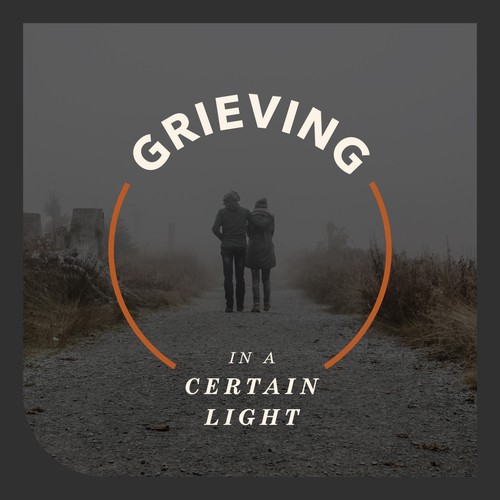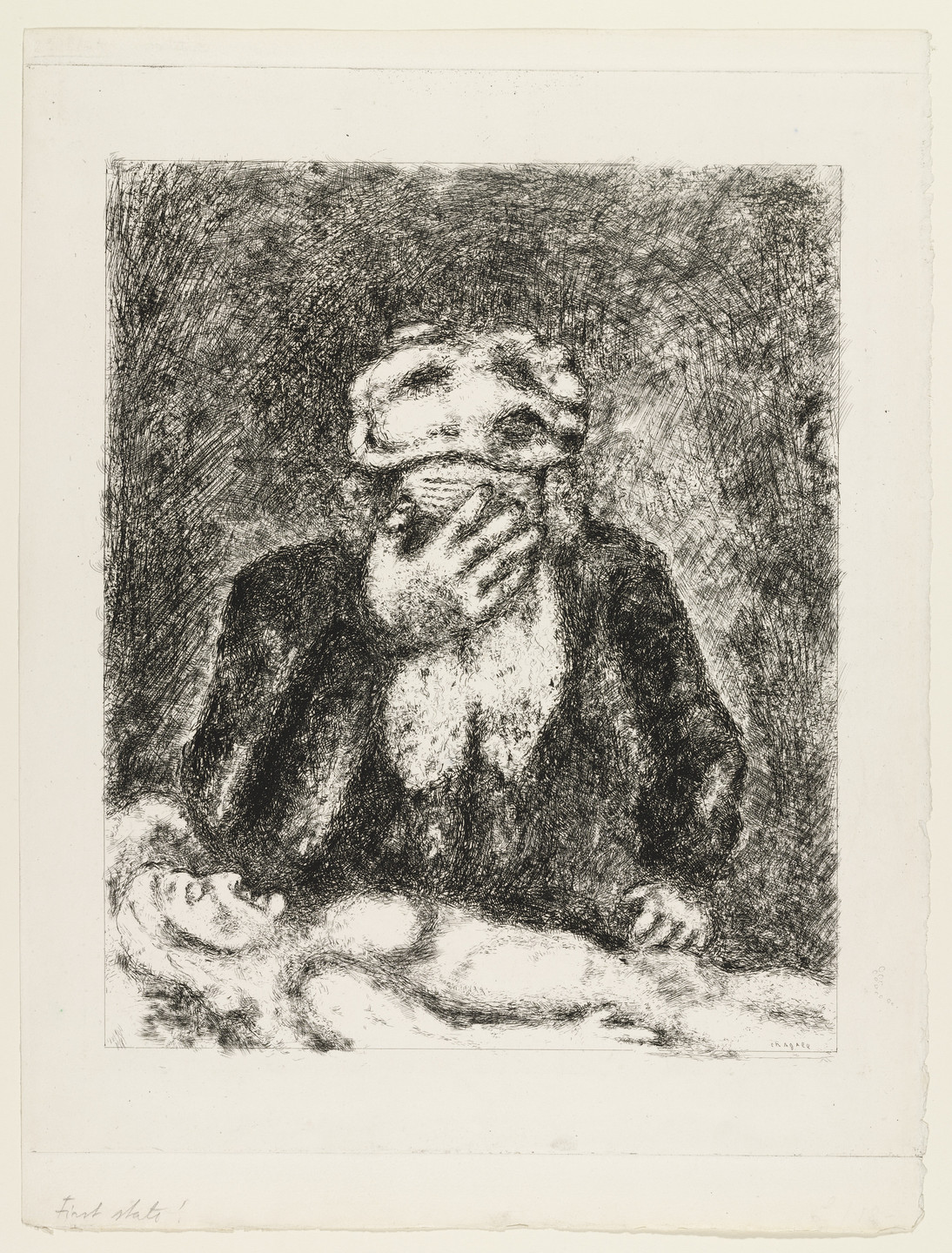May 1st, 2025
Who is the most famous person you've ever interacted with (even just to say hi or get an autograph)?

Focus 1 | Grieving is Worthwhile
Everyone experiences grief. As you grow through your life God uses the reality of death’s separation to show you what it means to truly die to self and become one with something much bigger.
Now that you've answered the Icebreaker question, here's another one to think about - this one about your funeral.
See what this Spotlight—and series— is focused on.
Tap on the words "Focus 1" in the image below to read this Spotlight's summary.
Tap on the words "Focus 1" in the image below to read this Spotlight's summary.

Come to God for mercy in the midst of this death problem.
Read through the following text with your group (if you're in a group). As you do, have all group members read the Biblical quotes aloud together.
In the conversation God had with Adam and Eve just after they'd committed the first sins, as he is explaining the cursed results of their actions, God says this:
“Cursed is the ground because of you;
through painful toil you will eat food from it
all the days of your life.
It will produce thorns and thistles for you,
and you will eat the plants of the field.
By the sweat of your brow
you will eat your food
until you return to the ground,
since from it you were taken;
for dust you are
and to dust you will return.”
Genesis 3:17–19
It is poetic as it is awful. The ground is cursed, human beings are from the ground, and human beings will now die and return to the ground. It's truly a sad, pathetic alternative to the ever-flourishing, eternal living that God had intended.
Do you know what happens next?
Adam named his wife Eve, because she would become the mother of all the living.
Genesis 3:20
Adam and Eve heard God's curse, but they also heard his promise. Just moments before God talked about dust-returning-to-dust, he said this to Eve:
I will make your pains in childbearing very severe;
with painful labor you will give birth to children.
Genesis 3:16
This pain would be totally worth it, though, because of the first curse God spoke—not to Adam or Eve, but to the devil:
And I will put enmity between you and the woman,
and between your offspring and hers;
he will crush your head,
and you will strike his heel.
Genesis 3:15
The offspring of the woman (this is Jesus!) who would come into the world through pain and die a death just like that which was promised to all who were "people of dust" would be God's way of mercifully counteracting the cursed results of sin.
Pray and meditate on this as you listen (and/or sing) along to the song "From the Dust" by Paul Zach and The Sing Team.
Read through the following text with your group (if you're in a group). As you do, have all group members read the Biblical quotes aloud together.
In the conversation God had with Adam and Eve just after they'd committed the first sins, as he is explaining the cursed results of their actions, God says this:
“Cursed is the ground because of you;
through painful toil you will eat food from it
all the days of your life.
It will produce thorns and thistles for you,
and you will eat the plants of the field.
By the sweat of your brow
you will eat your food
until you return to the ground,
since from it you were taken;
for dust you are
and to dust you will return.”
Genesis 3:17–19
It is poetic as it is awful. The ground is cursed, human beings are from the ground, and human beings will now die and return to the ground. It's truly a sad, pathetic alternative to the ever-flourishing, eternal living that God had intended.
Do you know what happens next?
Adam named his wife Eve, because she would become the mother of all the living.
Genesis 3:20
Adam and Eve heard God's curse, but they also heard his promise. Just moments before God talked about dust-returning-to-dust, he said this to Eve:
I will make your pains in childbearing very severe;
with painful labor you will give birth to children.
Genesis 3:16
This pain would be totally worth it, though, because of the first curse God spoke—not to Adam or Eve, but to the devil:
And I will put enmity between you and the woman,
and between your offspring and hers;
he will crush your head,
and you will strike his heel.
Genesis 3:15
The offspring of the woman (this is Jesus!) who would come into the world through pain and die a death just like that which was promised to all who were "people of dust" would be God's way of mercifully counteracting the cursed results of sin.
Pray and meditate on this as you listen (and/or sing) along to the song "From the Dust" by Paul Zach and The Sing Team.
Pray for God's greatness—and his tenderness.
In the poetic prophecies of Isaiah 25–26, God's power is beautifully connected to his loving mercy. Perhaps most importantly, Isaiah celebrates that God's victories and glories do the most incredible thing of all:
On this mountain he will destroy
the shroud that enfolds all peoples,
the sheet that covers all nations;
he will swallow up death forever.
The Sovereign Lord will wipe away the tears from all faces;
he will remove his people’s disgrace from all the earth.
The Lord has spoken.
Isaiah 25:7–8
Pray silently as you listen to and meditate on Isaiah 25:1–8 in thanks and praise that God has, in fact, had mercy on you in the midst of this complicated thing called death.
In the poetic prophecies of Isaiah 25–26, God's power is beautifully connected to his loving mercy. Perhaps most importantly, Isaiah celebrates that God's victories and glories do the most incredible thing of all:
On this mountain he will destroy
the shroud that enfolds all peoples,
the sheet that covers all nations;
he will swallow up death forever.
The Sovereign Lord will wipe away the tears from all faces;
he will remove his people’s disgrace from all the earth.
The Lord has spoken.
Isaiah 25:7–8
Pray silently as you listen to and meditate on Isaiah 25:1–8 in thanks and praise that God has, in fact, had mercy on you in the midst of this complicated thing called death.
Grieving is worthwhile when God is with you as you grieve.
At its core, grief is about separation and the pain it causes. It hurts to be apart from people who are important to you even for a few days—it hurts much more when it seems like the separation will last indeterminably longer. Human beings were not meant to be alone and so death is unnatural and difficult.
This is why it is so kind and incredible of God to come close enough to you to wipe the tears from your eyes. He understands what grieving means, why it hurts, and what can be done about it.
Already at this point in the Spotlight, you've thought of someone. You've considered a person who you care about who has died. You've been aware of the pain that death caused—and that's good…
Now, listen to this song. As you listen, be just as aware of the God who does not, will not, and cannot leave you to suffer that grief alone. (Once you press play to start the song, you can click through the lyrics in the frame below the video player.)
At its core, grief is about separation and the pain it causes. It hurts to be apart from people who are important to you even for a few days—it hurts much more when it seems like the separation will last indeterminably longer. Human beings were not meant to be alone and so death is unnatural and difficult.
This is why it is so kind and incredible of God to come close enough to you to wipe the tears from your eyes. He understands what grieving means, why it hurts, and what can be done about it.
Already at this point in the Spotlight, you've thought of someone. You've considered a person who you care about who has died. You've been aware of the pain that death caused—and that's good…
Now, listen to this song. As you listen, be just as aware of the God who does not, will not, and cannot leave you to suffer that grief alone. (Once you press play to start the song, you can click through the lyrics in the frame below the video player.)

Read the text below.
Sarah lived to be a hundred and twenty-seven years old. She died at Kiriath Arba (that is, Hebron) in the land of Canaan, and Abraham went to mourn for Sarah and to weep over her.
Then Abraham rose from beside his dead wife and spoke to the Hittites. He said, “I am a foreigner and stranger among you. Sell me some property for a burial site here so I can bury my dead.”
The Hittites replied to Abraham, “Sir, listen to us. You are a mighty prince among us. Bury your dead in the choicest of our tombs. None of us will refuse you his tomb for burying your dead.”
Then Abraham rose and bowed down before the people of the land, the Hittites. He said to them, “If you are willing to let me bury my dead, then listen to me and intercede with Ephron son of Zohar on my behalf so he will sell me the cave of Machpelah, which belongs to him and is at the end of his field. Ask him to sell it to me for the full price as a burial site among you.”
Ephron the Hittite was sitting among his people and he replied to Abraham in the hearing of all the Hittites who had come to the gate of his city. “No, my lord,” he said. “Listen to me; I give you the field, and I give you the cave that is in it. I give it to you in the presence of my people. Bury your dead.”
Again Abraham bowed down before the people of the land and he said to Ephron in their hearing, “Listen to me, if you will. I will pay the price of the field. Accept it from me so I can bury my dead there.” Ephron answered Abraham, “Listen to me, my lord; the land is worth four hundred shekels of silver, but what is that between you and me? Bury your dead.”
Abraham agreed to Ephron’s terms and weighed out for him the price he had named in the hearing of the Hittites: four hundred shekels of silver, according to the weight current among the merchants. So Ephron’s field in Machpelah near Mamre—both the field and the cave in it, and all the trees within the borders of the field—was deeded to Abraham as his property in the presence of all the Hittites who had come to the gate of the city.
Afterward Abraham buried his wife Sarah in the cave in the field of Machpelah near Mamre (which is at Hebron) in the land of Canaan. So the field and the cave in it were deeded to Abraham by the Hittites as a burial site.
Genesis 23
Discuss Abraham's grieving in this story.
Give a little background to it all.

Abraham Mourns Sarah by Marc Chagall (1931–39)
As the chapter starts, Abraham and Sarah were not in the same place—which means Abraham was not there for Sarah's death. When he found out she died, he "went to mourn for Sarah and to weep over her." Martin Luther reflected beautifully on Abraham's mourning here in his commentary on Genesis:
But what about the statement of Moses that Abraham came to mourn and weep? Did a man so great weep, sorrow, put on mourning clothes, and walk about with a sad and downcast expression? Where is that triumphant victor over so many exiles and wanderings through Syria, Egypt, and the entire land of Canaan? Where is the man who overcame four kings and set Lot free, offered his dearly beloved son (nothing like this is found in any other historical account), was willing to slay his son—who was the hope of future generations and of the promise—and in this manner conquered and killed his loftiest natural affection?
Why, then, does Abraham weep? Why does he not show himself a man in this instance? He conducts himself exactly as if he lacked such a lofty spirit and such heroic impulses and had never been disciplined by any perils or adversities.
My answer is: By this example Holy Scripture shows that mourning or weeping over dead parents, a wife, or friends does not displease God. Indeed, it is wrong not to weep. The world, which is totally leprous, calls the lack of natural affection—which means not being influenced by affection or love for one’s wife, children, or relatives—courage; but this is utter madness and is not a virtue.
Luther's Works, Volume 4
Discuss the following questions based on this:

The purchase of a parcel of land at which Sarah can be buried takes up a significant part of this story. Abraham is insistent. This has everything to do with the fact that he was as he said: "I am a foreigner and stranger among you."
These words are actually reflected on in depth by King David in Psalm 39. He is struggling with the realities of his limitations as a human and as a person, saying things like this:
Show me, Lord, my life’s end
and the number of my days;
let me know how fleeting my life is.
You have made my days a mere handbreadth;
the span of my years is as nothing before you.
Everyone is but a breath,
even those who seem secure.
Psalm 39:4–5
and he concludes the Psalm this way:
Hear my prayer, Lord,
listen to my cry for help;
do not be deaf to my weeping.
I dwell with you as a foreigner, a stranger,
as all my ancestors were.
Psalm 39:12
Discuss the following questions based on this:

Sarah holds a special place in the Bible. She is the only woman in the Old Testament whose death is recorded along with her age—the same way that Hebrew patriarch's deaths are recorded. She is one of two women mentioned in the "heroes of faith" section of the New Testament book of Hebrews (chapter 11).
Still, Sarah died. Luther comments on this with these words:
Scripture has no comments even on the death of other matriarchs, just as it makes no mention of how many years Eve lived and of where she died. Of Rachel it is recorded that she died in childbirth (Gen. 35:16–19). All the other women it passes over and covers with silence, with the result that we have no knowledge of the death of Mary, the mother of Christ. Sarah alone has this glory, that the definite number of her years, the time of her death, and the place of her burial are described. Therefore this is great praise and very sure proof that she was precious in the eyes of God.
But these facts do not concern Sarah, who is already dead, as much as they concern us, who are still alive. For it is a very great comfort to hear that the departure and death of that most saintly matriarch and of all the fathers, in comparison with whom we are nothing, differs in no wise from our own death but was just as odious and ignominious as our own is. Their bodies were buried, consumed by worms, and hidden in the earth on account of their stench, not otherwise than if they had not been the corpses of saints; yet they were most saintly people, and, although departed, they are actually alive in Christ.
Accordingly, these things are written for our sakes, in order that we may know that the most saintly fathers and mothers underwent the same experiences we are wont to undergo. Nevertheless, it is certain about them that in the eyes of God they live.
Luther's Works, Volume 4
Apply that last reading by doing this:
If in any way you have felt a bit of pity for Abraham as he mourns, weeps, and works to bury his wife Sarah, then you, too (in a smaller way than Abraham) have grieved her death. Now find comfort in it: Put into your own words the comfort Martin Luther pointed out in Sarah's death.
Sarah lived to be a hundred and twenty-seven years old. She died at Kiriath Arba (that is, Hebron) in the land of Canaan, and Abraham went to mourn for Sarah and to weep over her.
Then Abraham rose from beside his dead wife and spoke to the Hittites. He said, “I am a foreigner and stranger among you. Sell me some property for a burial site here so I can bury my dead.”
The Hittites replied to Abraham, “Sir, listen to us. You are a mighty prince among us. Bury your dead in the choicest of our tombs. None of us will refuse you his tomb for burying your dead.”
Then Abraham rose and bowed down before the people of the land, the Hittites. He said to them, “If you are willing to let me bury my dead, then listen to me and intercede with Ephron son of Zohar on my behalf so he will sell me the cave of Machpelah, which belongs to him and is at the end of his field. Ask him to sell it to me for the full price as a burial site among you.”
Ephron the Hittite was sitting among his people and he replied to Abraham in the hearing of all the Hittites who had come to the gate of his city. “No, my lord,” he said. “Listen to me; I give you the field, and I give you the cave that is in it. I give it to you in the presence of my people. Bury your dead.”
Again Abraham bowed down before the people of the land and he said to Ephron in their hearing, “Listen to me, if you will. I will pay the price of the field. Accept it from me so I can bury my dead there.” Ephron answered Abraham, “Listen to me, my lord; the land is worth four hundred shekels of silver, but what is that between you and me? Bury your dead.”
Abraham agreed to Ephron’s terms and weighed out for him the price he had named in the hearing of the Hittites: four hundred shekels of silver, according to the weight current among the merchants. So Ephron’s field in Machpelah near Mamre—both the field and the cave in it, and all the trees within the borders of the field—was deeded to Abraham as his property in the presence of all the Hittites who had come to the gate of the city.
Afterward Abraham buried his wife Sarah in the cave in the field of Machpelah near Mamre (which is at Hebron) in the land of Canaan. So the field and the cave in it were deeded to Abraham by the Hittites as a burial site.
Genesis 23
Discuss Abraham's grieving in this story.
Give a little background to it all.
- What can you think of that Abraham and Sarah went through together over the course of their marriage? (If you need help, see Genesis 12, 16, or 22 or this timeline for examples.)
- How would each of these things have increased their connection to each other?

Abraham Mourns Sarah by Marc Chagall (1931–39)
As the chapter starts, Abraham and Sarah were not in the same place—which means Abraham was not there for Sarah's death. When he found out she died, he "went to mourn for Sarah and to weep over her." Martin Luther reflected beautifully on Abraham's mourning here in his commentary on Genesis:
But what about the statement of Moses that Abraham came to mourn and weep? Did a man so great weep, sorrow, put on mourning clothes, and walk about with a sad and downcast expression? Where is that triumphant victor over so many exiles and wanderings through Syria, Egypt, and the entire land of Canaan? Where is the man who overcame four kings and set Lot free, offered his dearly beloved son (nothing like this is found in any other historical account), was willing to slay his son—who was the hope of future generations and of the promise—and in this manner conquered and killed his loftiest natural affection?
Why, then, does Abraham weep? Why does he not show himself a man in this instance? He conducts himself exactly as if he lacked such a lofty spirit and such heroic impulses and had never been disciplined by any perils or adversities.
My answer is: By this example Holy Scripture shows that mourning or weeping over dead parents, a wife, or friends does not displease God. Indeed, it is wrong not to weep. The world, which is totally leprous, calls the lack of natural affection—which means not being influenced by affection or love for one’s wife, children, or relatives—courage; but this is utter madness and is not a virtue.
Luther's Works, Volume 4
Discuss the following questions based on this:
- Reflect on Abraham's weeping. Have you thought much about it before? What do you notice or appreciate about it?
- How could you use this example to encourage a friend or loved one as they grieve a loss?

The purchase of a parcel of land at which Sarah can be buried takes up a significant part of this story. Abraham is insistent. This has everything to do with the fact that he was as he said: "I am a foreigner and stranger among you."
These words are actually reflected on in depth by King David in Psalm 39. He is struggling with the realities of his limitations as a human and as a person, saying things like this:
Show me, Lord, my life’s end
and the number of my days;
let me know how fleeting my life is.
You have made my days a mere handbreadth;
the span of my years is as nothing before you.
Everyone is but a breath,
even those who seem secure.
Psalm 39:4–5
and he concludes the Psalm this way:
Hear my prayer, Lord,
listen to my cry for help;
do not be deaf to my weeping.
I dwell with you as a foreigner, a stranger,
as all my ancestors were.
Psalm 39:12
Discuss the following questions based on this:
- Why does death make people aware of the fact that they are foreigners and strangers in the world they currently inhabit?
- Have you ever felt like this? When have you been keenly aware, like David in Psalm 39, of how short life is? When have you been keenly aware, like Abraham in Genesis 23, of feeling like you don't belong?

Sarah holds a special place in the Bible. She is the only woman in the Old Testament whose death is recorded along with her age—the same way that Hebrew patriarch's deaths are recorded. She is one of two women mentioned in the "heroes of faith" section of the New Testament book of Hebrews (chapter 11).
Still, Sarah died. Luther comments on this with these words:
Scripture has no comments even on the death of other matriarchs, just as it makes no mention of how many years Eve lived and of where she died. Of Rachel it is recorded that she died in childbirth (Gen. 35:16–19). All the other women it passes over and covers with silence, with the result that we have no knowledge of the death of Mary, the mother of Christ. Sarah alone has this glory, that the definite number of her years, the time of her death, and the place of her burial are described. Therefore this is great praise and very sure proof that she was precious in the eyes of God.
But these facts do not concern Sarah, who is already dead, as much as they concern us, who are still alive. For it is a very great comfort to hear that the departure and death of that most saintly matriarch and of all the fathers, in comparison with whom we are nothing, differs in no wise from our own death but was just as odious and ignominious as our own is. Their bodies were buried, consumed by worms, and hidden in the earth on account of their stench, not otherwise than if they had not been the corpses of saints; yet they were most saintly people, and, although departed, they are actually alive in Christ.
Accordingly, these things are written for our sakes, in order that we may know that the most saintly fathers and mothers underwent the same experiences we are wont to undergo. Nevertheless, it is certain about them that in the eyes of God they live.
Luther's Works, Volume 4
Apply that last reading by doing this:
If in any way you have felt a bit of pity for Abraham as he mourns, weeps, and works to bury his wife Sarah, then you, too (in a smaller way than Abraham) have grieved her death. Now find comfort in it: Put into your own words the comfort Martin Luther pointed out in Sarah's death.

Watch this video and consider the following.
Is there someone in your life you could simply join and listen to as they grieve? If so, what's the very next action you could take toward letting them know you're here—not to fix them, but to be with them?
Is there someone in your life you could simply join and listen to as they grieve? If so, what's the very next action you could take toward letting them know you're here—not to fix them, but to be with them?
Feel free to submit a prayer request by filling out the below form.
(If you choose to make your request public, you'll see it display in the Current at the end of the Spotlight along with anyone else who did the same.)
(If you choose to make your request public, you'll see it display in the Current at the end of the Spotlight along with anyone else who did the same.)
Pray through your requests—together—as a group.
After submitting your requests in the above form, take some time to share with your group whatever requests the group might have for this week.
After submitting your requests in the above form, take some time to share with your group whatever requests the group might have for this week.

First, read through Psalm 39 as a group.
I said, “I will watch my ways
and keep my tongue from sin;
I will put a muzzle on my mouth
while in the presence of the wicked.”
So I remained utterly silent,
not even saying anything good.
But my anguish increased;
my heart grew hot within me.
While I meditated, the fire burned;
then I spoke with my tongue:
“Show me, Lord, my life’s end
and the number of my days;
let me know how fleeting my life is.
You have made my days a mere handbreadth;
the span of my years is as nothing before you.
Everyone is but a breath,
even those who seem secure.
“Surely everyone goes around like a mere phantom;
in vain they rush about, heaping up wealth
without knowing whose it will finally be.
“But now, Lord, what do I look for?
My hope is in you.
Save me from all my transgressions;
do not make me the scorn of fools.
I was silent; I would not open my mouth,
for you are the one who has done this.
Remove your scourge from me;
I am overcome by the blow of your hand.
When you rebuke and discipline anyone for their sin,
you consume their wealth like a moth—
surely everyone is but a breath.
“Hear my prayer, Lord,
listen to my cry for help;
do not be deaf to my weeping.
I dwell with you as a foreigner,
a stranger, as all my ancestors were.
Look away from me, that I may enjoy life again
before I depart and am no more.”
Psalm 39
Now, pray together, by using the following prompts.
Designate one group member to begin and end the prayer, but allow for anyone to chime in with anything they'd like to pray as they feel inspired by the prompts below.
Praise
Response
Requests
Readiness
I said, “I will watch my ways
and keep my tongue from sin;
I will put a muzzle on my mouth
while in the presence of the wicked.”
So I remained utterly silent,
not even saying anything good.
But my anguish increased;
my heart grew hot within me.
While I meditated, the fire burned;
then I spoke with my tongue:
“Show me, Lord, my life’s end
and the number of my days;
let me know how fleeting my life is.
You have made my days a mere handbreadth;
the span of my years is as nothing before you.
Everyone is but a breath,
even those who seem secure.
“Surely everyone goes around like a mere phantom;
in vain they rush about, heaping up wealth
without knowing whose it will finally be.
“But now, Lord, what do I look for?
My hope is in you.
Save me from all my transgressions;
do not make me the scorn of fools.
I was silent; I would not open my mouth,
for you are the one who has done this.
Remove your scourge from me;
I am overcome by the blow of your hand.
When you rebuke and discipline anyone for their sin,
you consume their wealth like a moth—
surely everyone is but a breath.
“Hear my prayer, Lord,
listen to my cry for help;
do not be deaf to my weeping.
I dwell with you as a foreigner,
a stranger, as all my ancestors were.
Look away from me, that I may enjoy life again
before I depart and am no more.”
Psalm 39
Now, pray together, by using the following prompts.
Designate one group member to begin and end the prayer, but allow for anyone to chime in with anything they'd like to pray as they feel inspired by the prompts below.
Praise
- I praise you that you are eternal because…
- I praise you that you have saved me from…
- I praise you that you rebuked me when…
- I praise you for your discipline in my life when…
Response
- Thank you for drawing me back to you …
- I confess that I am silent before you about…
- Help me to remember your eternal perspective about …
- God, I confess _______ to you…
Requests
- Help me to have an eternal perspective in my numbered days…
- Save me from my transgressions of…
- God, convict me of my sin of…
- God, gently discipline me so that I …
- God, hear my cry for help about…
Readiness
- God, I know I will rejoice in you again in…
- Lord, help me to look to you for hope in…
- Lord, help me to repent and turn to you today when…
Close by praying along with the song, "Your Hands," by JJ Heller.
(Once you press play to start the song, you can click through the lyrics in the frame below the video player.)
(Once you press play to start the song, you can click through the lyrics in the frame below the video player.)
Sing along with (or listen to) this song to close out this Spotlight.
Feel free to sing along or simply listen. Do what makes you comfortable—but do whatever helps you focus on the song's meaning best.
Feel free to sing along or simply listen. Do what makes you comfortable—but do whatever helps you focus on the song's meaning best.

Let's wrap things up by taking a look at what's Current at Illume.
Tap on the buttons in the frame below to see what’s currently happening at Illume—information on everything from current and upcoming online content to live events and opportunities to serve in the community can all be found here.
Tap on the buttons in the frame below to see what’s currently happening at Illume—information on everything from current and upcoming online content to live events and opportunities to serve in the community can all be found here.
Posted in Grieving in a Certain Light

No Comments